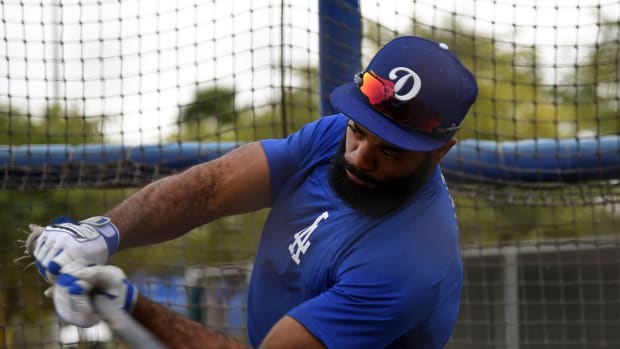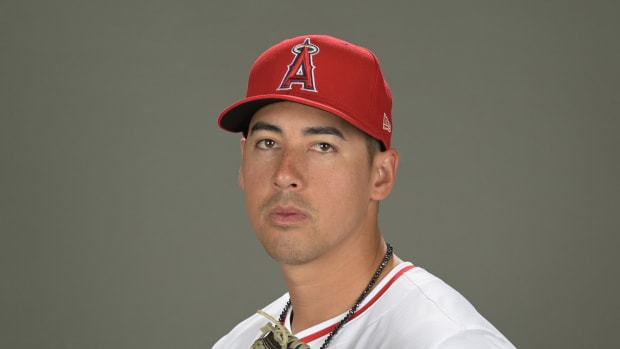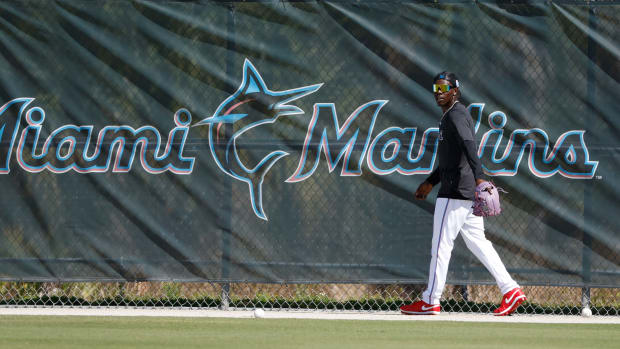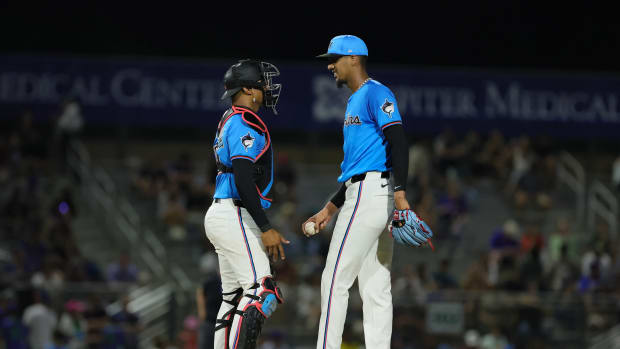Deadspin Hall of Fame Voter revealed as ESPN's Dan Le Batard
Dan Le Batard gave his Hall of Fame vote to Deadspin. The final ballot is pictured above, and the site describes the process here. (Photo Credit: Deadspin)
Back in November, the sports website Deadspin announced that it had purchased the vote of a Hall of Fame voter and that it would announce the identity of that voter as well as the content of his ballot in the immediate wake of Wednesday's announcement of the Hall of Fame results. True to their word, they did just that on Wednesday, revealing their proxy voter to be Dan Le Batard, longtime baseball writer for the Miami Herald and the host of eponymous sports-talk shows on ESPN2 and ESPN Radio. Le Batard, it was also revealed, will be donating all of the money he received from the website to charity.
Per Deadspin's Tim Marchman, Le Batard was just one of several writers to contact the site in response to their intent to purchase a vote. In fact, the site came close to securing what Marchman terms "a bloc of voters," and had reached agreement with another voter before that fell through for undisclosed reasons ("no fault of ours or the voter," writes Marchman) passing the buck to Le Batard, who agreed to sell his vote if the other fell through.
The clear message here, as ultimately delivered by Le Batard, is that there are numerous voters who are disenchanted with the Hall of Fame voting process and who share Deadspin's desire to expose what Marchman describes as its farcical nature. Le Batard gets to the heart of my personal issues with the process here:
. . . many people analyzing baseball with advanced metrics outside of mainstream media are doing a better job than mainstream media, and have taught us some things in recent years when we were behind. In other words, just because we went to journalism school and covered a few games, just because accepted outlets gave us their platform and power, I don't think we should have the pulpit to ourselves in 2014 that way we did in 1936. Baseball is always reticent to change, but our flawed voting process needs remodeling in a new media world.
Whatever you might think of what was a clear publicity stunt by Deadspin — the ballot Le Batard submitted on behalf of Deadspin's readers didn't differ meaningfully from hundreds of others as it included ten of this year's top 14 vote-getters, including Craig Biggio, who fell just two votes shy of induction, with saber-friendly choice Tim Raines not making the cut—Le Batard's point about the electorate failing to properly represent the present media environment is an important one.
When the Baseball Writers' Association of America voted for the first Hall of Fame class in 1936, newspapers dominated the sports media landscape. It wasn't until 1939 that every major league team broadcast its games on the radio, and television didn't become a feature of the typical American household until the 1950s. Now, however, most fans follow the game on television and the internet, with the latter placing online-only content (such as SI.com) on equal-at-worst footing with the digital editions of the local newspaper.
The BBWAA is not exclusively comprised of newspaper or even print-only writers, but for the vast majority of its membership, being a beat writer for a local paper was the means to entry. In fact, it was the only means to entry until 2007, and the Association has added non-print writers at a glacial pace since. Even beyond that, it remains the Baseball Writers' Association of America. Broadcasters, analysts, even authors—from Vin Scully and Bob Costas to Bill James and Steve Hirdt to Roger Angell and John Thorn (two of whom areHall of Famers themselves, and all of whom deserve to be) — remain on the outside of the Hall of Fame voting process.
As a means of calling attention to that fact, Deadspin and Le Batard's protest was likely effective. As a means of protesting the, in Le Batard's words, "moralizing" and "hypocrisy" of the voters' treatment of players they often merely suspect of having used performance-enhancing drugs, it seems to have been less effective. At best, it goosed the conversation over the process and funneled some money to an as-yet-unnamed charity. At worst, it will prompt the BBWAA to tighten their exclusive grip on the voting.
Of course, for that to happen, the BBWAA will need to bring the process into the 21st century. Deadspin and Le Batard made a big show of their vote-selling/buying, and Le Batard wrote that he imagines he'll have his vote taken away, but there's nothing to prove that this sort of thing hasn't happened before. Beyond the chances that a writer may have been leaned on or greased by a team or even a player back when things could still be done in secret, take a look at the last line of the voting instructions on the photo above: "Ballots must be submitted by mail or FAX . . ."
Seriously? As a former music critic, I used to vote in the Village Voice's annual "Pazz & Jop" critics' poll. Do you want to know how that single, independent weekly newspaper conducts its annual poll of the best albums of the year? They have a dedicated link on their website at which each of their more than 1,500 voters (by comparison, 571 writers voted for the Hall of Fame this year) must enter a personalized, six-digit ID code in order to access his or her ballot. It has been that way since the BBWAA website looked like this.
It's 2014 and Hall of Fame votes are still submitted exclusively by mail or FAX? Clearly the BBWAA isn't hording the Hall of Fame vote for the money. Did you notice that the ballot Le Batard filled out is just a sloppy photocopy? Honestly, after seeing Le Batard's ballot above, how confident are you that Craig Biggio actually received 427 votes, not the 429 required for induction this year?
I think it's clearly time for the Hall of Fame to take the reigns of the voting process itself. The Hall is a non-profit museum, but one with significant cash flow and a 21st century web site. It should establish new, inclusive parameters for the electorate, eliminate the maximum number of candidates that can be named on a single ballot (50 percent of the ballots submitted this year contained the maximum ten names, many by writers who likely would have voted for even more than ten men), and conduct the voting in a technologically advanced and secure fashion. As I wrote yesterday in reaction to Ken Gurnick's inexplicable (at least by Gurnick's explanation) Jack Morris-only ballot, a sufficiently inclusive electorate and ballot would take the focus off the process and put it back on the players and their candidacies. I know I'd much rather be writing about any one of the 36 players on the ballot than the BBWAAA, Ken Gurnick, Deadspin, and Dan Le Batard.




































